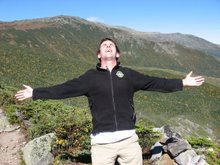Every culture has its collection of folklore and old wives' tale and Kazakhstan is far from an exception. Some of the ancient wisdom that locals have tried to pass down to me has been predictable. Other tidbits have been downright strange. Still more have simply been horrifying. Sadly, I have not been able to make even a modest breakthrough in any of my many attempts to refute these tales. Intellectual curiosity is not Kazakhstan's forte.
* I discovered one of the more innocuous superstitions when I had the gall to sit at the corner of the dinner table. Apparently, my chances of getting married are now hanging in the balance. For now, that is probably a good thing, so if the Kazakhs know something that I don't, that is fine by me.
* There is a depressingly large percentage of the population who think that vodka has not one, but several medicinal uses. While I personally have avoided this misguided fate, several other volunteers have been exhorted to take a shot of vodka to cure whatever ailed them. I have also heard stories of a few doctors who routinely inject vodka intravenously as a remedy, which I sincerely hope is not actually true. Perhaps the best vodka-based panacea was the warm-vodka neckwrap that one volunteer was encouraged to wear during Pre-Service Training when she had a cough. It seemed more like an ironic advertising campaign for Absolut than reality.
* Germ theory has not made it to Kazakhstan. During the winter, you will often hear people worry about the health ramifications of an open window despite the extreme temperatures to which they heat their buildings. Many people in Zhezkazgan also have an unshakable belief that snow and/or frost "kills viruses". Not the
cold, but specifically the snow or frost. In my time here, nobody has put two and two together and realized that these pet theories flatly contradict each other.
* The most stunning piece of "conventional wisdom" I have encountered in this country dates back to my time in Issyk. Another volunteer had developed a bit of a cough, which slowly worsened. His family generously suggested that they opt for the tried-and-true method of killing a dog and rubbing the fat on his chest. Of course, it wouldn't be acceptable to use one of Issyk's dozens of mangy stray dogs -- one must buy a clean one from a pet store. Dave declined the offer. It's the thought that counts!
* The Kazakh discomfort with the cold extends to drinks as well. I am an oddity for enjoying plain cold water -- although drinking buckets of cold water is a singularly American thing. When another volunteer recovered from a short illness, we went to a cafe and had a few beers. Upon his arrival back home, his family admonished him for drinking cold beers so soon after being sick, which is an entirely reasonable thing to do; except, of course, their argument was entirely based on the fact that it was a cold drink, not the fact that it was alcohol. Apparently, cold drinks give you sore throats and make you even thirstier. I don't know how I've survived the past 22 years.
 (The view from above Lake Issyk, the source of one of many small rivers that flow down from the Tian Shan to feed Lake Balkhash)
(The view from above Lake Issyk, the source of one of many small rivers that flow down from the Tian Shan to feed Lake Balkhash) (The results of the most-anticipated event of PST. Zhezkazgan is a long way from just about everybody)
(The results of the most-anticipated event of PST. Zhezkazgan is a long way from just about everybody) (My daily route to training in Issyk. Despite the summer heat, the snow never quite disappeared from the mountains)
(My daily route to training in Issyk. Despite the summer heat, the snow never quite disappeared from the mountains) (On the road to Charyn Canyon. The southeast corner of Kazakhstan is the most primal place I have ever seen. No people and few living things of any sort other than hardy grass. Just gritty land, snow-capped mountains, and sky)
(On the road to Charyn Canyon. The southeast corner of Kazakhstan is the most primal place I have ever seen. No people and few living things of any sort other than hardy grass. Just gritty land, snow-capped mountains, and sky) (The comparisons to the Grand Canyon are silly, but the Charyn Canyon is nonetheless an impressive sight)
(The comparisons to the Grand Canyon are silly, but the Charyn Canyon is nonetheless an impressive sight)






